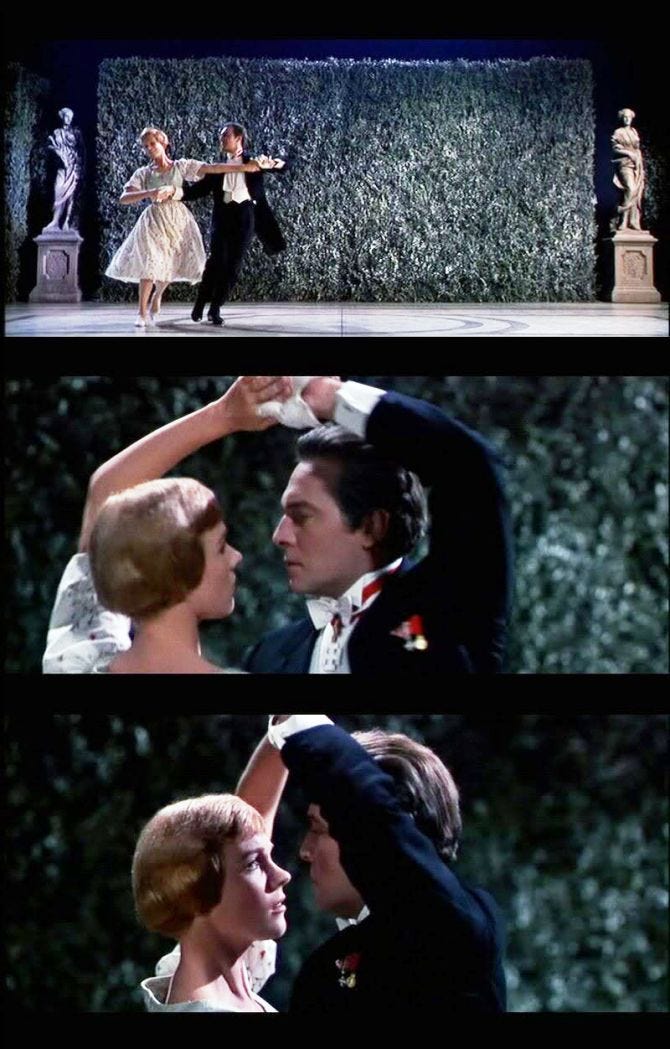Let Go (to Live The Life You Were Born to Live)
Timeless wisdom from one of the most beautiful films ever made
Hey, it’s Alexandra. Welcome to my weekly newsletter where I share my latest reflections on professional development and well-being.
If you’re not a subscriber, here’s what you missed recently:
Subscribe to get future posts emailed to you:
Today’s post is dedicated to timeless wisdom from one of the most beautiful films ever made.
☕️ Read time: 4 mins (best with tea or coffee)
I nearly choked on my coffee when I scrolled past the funniest comment I’ve ever read about The Sound of Music. A woman had retweeted one of the most beautiful scenes from the 1965 classic with this caption:
Do you know how shocked I was to find out it was a musical about escaping literal Nazis and “intermission” wasn’t just a funny word for “The End.”
I instantly thought of the FRIENDS episode where Phoebe is shocked to learn Old Yeller’s fate after her mother spent her childhood shutting the TV off pre-rabies saying “The End.”
Regardless of whether you’re watching a favourite film in its entirety for the first time or the umpteenth one, there’s a universal truth to each cinematic experience:
You will interpret the film in new ways.
I say this having rewatched The Sound of Music on Sunday, over two decades since I’d seen it last.
To my surprise, the classic tale on love, overcoming loss, and refusing to capitulate to the most extreme and heinous form of power, revealed another lens to me upon watching it as an adult:
Let go of what you thought was meant for you to make space for what is.
“Set in Austria on the eve of the Anschluss in 1938,” The Sound of Music portrays main character Maria as an aspiring nun whose free spirit, outspoken nature, and even musical talents are “problematic” when she can’t refrain from singing in the Abbey.
Despite Maria’s best efforts to fit in, the Reverand Mother proposes an alternative. She assigns Maria to be a governess for a local family so she can explore life outside the Abbey before taking vows to become a nun.
Maria protests about being “sent away” from her “home” and reasons she’s wanted to be a nun ever since she was a young girl peeking over the Abbey walls to hear music.
But the Reverand Mother is adamant.
And thank God for that—no pun intended—because that is where Maria’s story begins.
Maria packs up her life into one small bag and a guitar case that she swings back and forth as she belts out self-affirming tunes on her way to her new post.
But things get off to an unnerving start when she arrives to find that the von Trapp family is headed by a widowed Naval Captain who orders his seven children around as if they were aboard a ship.
After some initial hazing involving a slimy frog and a painful pinecone, Maria manages to win over the children.
But appalled by her free spirit and outspoken nature regarding how he ought to parent his children, the Captain orders Maria to pack her things.
But then just moments after he has dismissed her, the Captain seeks her out to apologize and ask her to stay.
He’s in awe to discover that she’s brought music back into his house by teaching his children to sing and play guitar.
For the first time since he tragically lost his wife, his house feels like a home.
Everything seems dandy moving forward.
That is until Maria and the Captain realize they're in love.
The problem is twofold.
First, Maria is meant to be on “God’s errand” and has planned to become a nun. The other problem is the Captain is courting a woman he’s planned to marry.
Overcome by the situation, Maria flees back to the Abbey.
But upon learning of her woes, the Reverand Mother orders Maria to go back.
“These walls were not built to shut out problems. You have to face them,” she says.
She assures Maria that the love between two people is as much of a service to God as being a nun and that the most important virtue of all is to honour your calling.
“You have to live the life you were born to live.”
Resolved to face her problems, Maria returns to the von Trapp household.
But despite her gleeful welcome from the children and the Captain, Maria is gutted to learn the latter is officially engaged.
However, she remains resolved to continue her post until another governess can replace her.
But in the end, the Captain—much like Maria at the turning point in her journey—acknowledges that he must let go of what he thought was meant for him to make space for what is.
So he ends his engagement and marries Maria instead.
I’d like to say they lived happily ever and while they did for the most part, per that hilarious post I stumbled upon, they were forced to flee Austria and the Nazis after their wedding (evidently not everyone makes it to that part of the film).
But today’s post is about my latest takeaway:
Let go of what you thought was meant for you to make space for what is.
Letting go is a scary prospect. I once read that most people choose familiar pain over fear of the unknown. How sad is that?
I hope like Maria and the Captain, you find the confidence and faith you need—in yourself and whatever you believe in—to embrace the unknown in both your personal and professional lives.
Don’t settle.
I know I won’t.
Thanks for reading and have a wonder-full week,
P.S. I regard Austria as one of the most breathtaking countries in the world. I’ve been to Vienna but Salzburg is still on my bucket list and I would love to visit the “7 Places Every Fan Of ‘The Sound Of Music’ Should Visit.” I now especially want to stay at the fictional von Trapp family home-turned-hotel.














A different view on a favourite movie of mine. Made me think that in order to let go of the past, you have to let go of lost possibilities of the future and live in the present
I love this movie and think that it is so underrated. Just this morning in a business meeting, I said, to quote singing Maria, "Let's start at the very beginning, a very good place to start." Shocked the hell out of a room full of businesspeople used to sports and military metaphors.
Another great theme of The Sound is the importance of effort. "Climb Every Mountain 'til you find your dream".